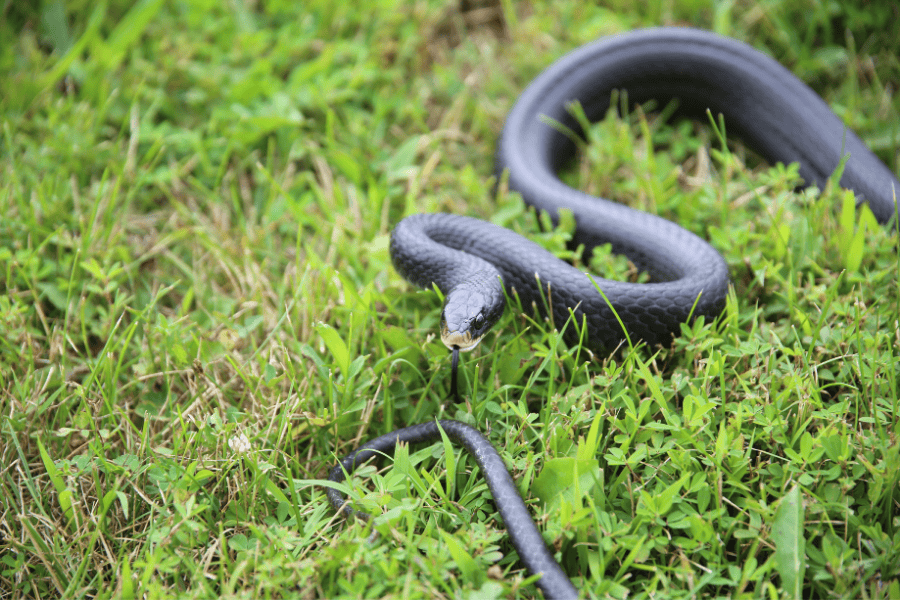
Feb 14, 2025 | Wildlife
Georgia is home to a wide variety of snake species, both venomous and non-venomous. While most snakes play a vital role in the ecosystem by controlling rodent populations, their presence in and around homes can be unsettling. Understanding snake behavior, knowing what to do if you encounter one, and exploring snake pest control options can help you manage and prevent unwanted snake encounters.
Snake Pest Control in Georgia
Common Snakes Found in Georgia
Georgia has over 40 snake species, with only a few being venomous. Knowing the difference can help you determine whether a snake poses a danger.
Non-Venomous Snakes
- Eastern Rat Snake – Often found near barns, attics, and basements, these snakes help control rodent populations.
- Black Racer – Fast-moving and non-aggressive, these snakes are commonly seen in yards and gardens.
- Garter Snake – Recognizable by their striped pattern, they are harmless and frequently found in grassy areas.
- Corn Snake – Sometimes mistaken for copperheads, corn snakes are non-venomous and excellent at controlling pests.
Venomous Snakes
- Eastern Diamondback Rattlesnake – The largest venomous snake in the U.S., found in pine forests and coastal areas.
- Copperhead – Often camouflaged in leaves, copperheads are responsible for many snake bites in Georgia.
- Cottonmouth (Water Moccasin) – Typically found near water, they are aggressive and highly venomous.
- Timber Rattlesnake – Found in wooded areas, these snakes deliver a dangerous bite.
- Coral Snake – Rare but venomous, coral snakes have bright red, yellow, and black bands.
What to Do If You Encounter a Snake
Encountering a snake can be alarming, but staying calm is crucial. Here’s what you should do:
- Identify from a Safe Distance – Avoid approaching or handling the snake.
- Back Away Slowly – Snakes are unlikely to attack unless threatened.
- Secure Children and Pets – Keep them away from the snake’s path.
- Do Not Attempt to Kill It – Many snake bites occur when people try to kill or handle them.
- Call a Professional – If you suspect the snake is venomous or it is in your home, contact a snake removal expert.
Can Pest Control Get Rid of Snakes?
Many people wonder, “Can pest control get rid of snakes?” While traditional pest control focuses on insects and rodents, some wildlife control companies specialize in snake removal. These services include:
- Snake Trapping and Removal – Humane traps are used to capture and relocate snakes.
- Property Inspections – Professionals inspect your home for entry points and recommend sealing gaps and cracks.
- Habitat Modification – Removing debris, tall grass, and woodpiles makes your property less attractive to snakes.
- Rodent Control – Since snakes follow their food source, controlling rodents can reduce snake sightings.
What Keeps Snakes Away?
To prevent snakes from entering your property, consider the following snake control strategies:
Eliminate Food Sources
Snakes are drawn to areas with ample food. Reducing rodents, insects, and bird eggs in your yard can deter them.
Modify Landscaping
- Trim Grass and Bushes – Keep your lawn short and bushes trimmed to reduce hiding spots.
- Remove Woodpiles and Clutter – Snakes often hide in stacked wood, debris, and overgrown vegetation.
- Use Snake-Repellent Plants – Plants like marigolds, lemongrass, and wormwood may deter snakes.
Seal Entry Points
Snakes can enter homes through tiny gaps. Seal cracks, holes, and vents with mesh or caulk to prevent entry.
Use Snake Repellents
There are natural and commercial snake repellents available, including:
- Sulfur and Naphthalene – Found in snake repellent granules.
- Essential Oils – Clove and cinnamon oil sprays may repel snakes.
- Commercial Repellents – Products specifically designed for snake deterrence.
Snake Removal: When to Call a Professional
If you frequently see snakes on your property or inside your home, it’s time to call a wildlife control company. Professional snake removal services ensure:
- Safe Handling and Relocation – Experts use proper tools to remove snakes without harm.
- Snake Identification – Professionals determine if the snake is venomous.
- Prevention Plans – Wildlife control experts help keep snakes from returning.
Conclusion
Snakes are an essential part of Georgia’s ecosystem, but they can be a nuisance when they invade homes and yards. By identifying common snake species, knowing what to do if you encounter one, and implementing snake pest control strategies, you can minimize encounters. If you have persistent snake problems, a professional wildlife control company can provide safe and effective snake removal solutions.
For expert assistance in handling snakes on your property, contact a trusted pest control company specializing in snake control and wildlife removal.
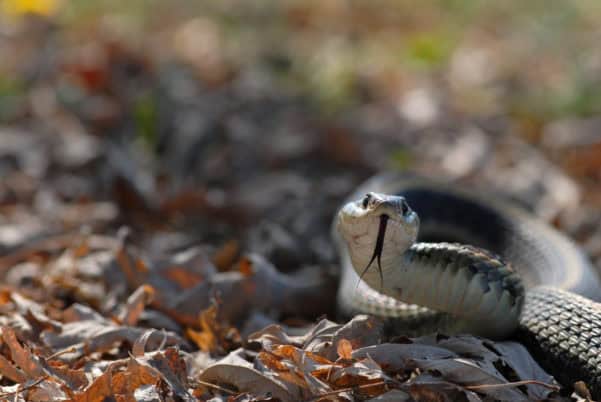
Sep 4, 2024 | Florida Pest Control
Florida’s diverse wildlife includes a range of snake species. While most are harmless and play important roles in our ecosystem, it’s always good to be aware of what you might encounter and how to keep your yard snake-free. Here’s a friendly look at common Florida snakes and simple tips for keeping snakes out of your yard.
Keeping Snakes Out of Your Yard
Common Snakes in Florida
- Eastern Garter Snake: These small, harmless snakes have distinct stripes running down their bodies. They are often found in gardens, meadows, and wooded areas.
- Southern Black Racer: Slender and black, these snakes are fast movers and can often be mistaken for a more dangerous species. You’ll likely find them in open areas, including yards and grassy fields.
- Eastern Coral Snake: Known for their bright red, yellow, and black bands, these are venomous but are rarely encountered by humans. These snakes prefer sandy or loose soils in wooded areas.
- Copperhead: Recognizable by its copper-colored head and hourglass-shaped bands, you will typically find them in wooded or rocky areas, sometimes near water.
- Black Pine Snake: These snakes are large and non-venomous. They have black bodies and white or yellow bellies. They will often live in sandy, well-drained soils in pine forests.
Easy Ways to Prevent Snakes
- Maintain a Clean Yard: Snakes love clutter and tall grass, which offer perfect hiding spots. Look to regularly mow your lawn, trim bushes, and remove piles of leaves and debris.
- Secure Your Yard: Snakes can enter through gaps or holes, so it’s crucial to check your yard’s fencing for gaps and ensure fencing is buried a few inches underground to prevent snakes from slithering through.
- Remove Food Sources: Snakes are attracted to places where they can find food, like rodents and insects. Place your pet food, bird seed, and other food in sealed containers to manage any rodent issues and ultimately prevent snakes from entering your yard.
- Use Snake-Repellent Plants: Some plants can naturally repel snakes with their strong odors. Consider planting marigolds, lemongrass, or garlic around your yard to keep snakes at bay.
- Monitor Water Sources: Standing water can attract snakes and their prey. Ensure there is proper drainage around your property and eliminate any sources of standing water in your yard.
- Use Outdoor Lighting Wisely: Excessive outdoor lighting can attract insects, which in turn attract snakes. Use motion-activated lights to reduce attraction to your yard.
If you notice more snakes on your property than you’re comfortable with, call a wildlife company near you. These experts will provide you with a snake removal and prevention plan for keeping snakes out of your yard in the future.
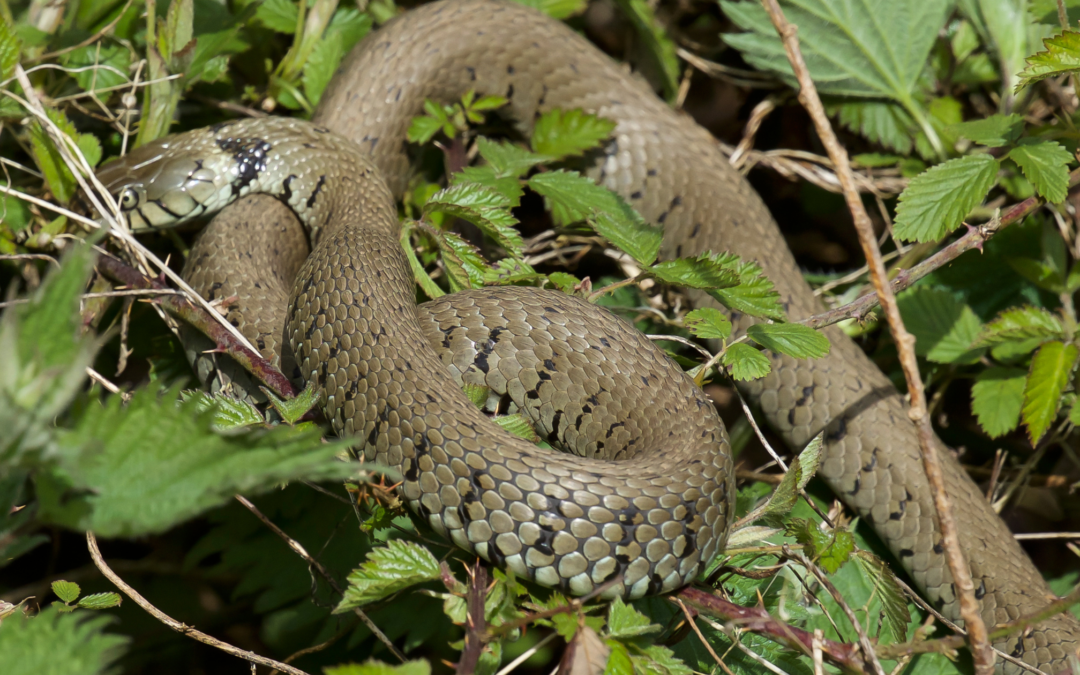
Mar 1, 2024 | Wildlife
As the weather warms up in Georgia, so does the activity of one of the area’s most misunderstood creatures: snakes. With snake season approaching, it’s essential to take proactive steps to ensure your yard is prepared for these slithery visitors. Whether you’re concerned about encountering venomous species or simply want to minimize their presence around your home, proper preparation and understanding are key. Here’s everything you need to know to get your yard ready for snake season:
When is Snake Season in North Georgia?
Snake season in Georgia typically begins in the spring, around March or April, and extends through the summer months until around September or October. During this time, snakes become more active as they emerge from hibernation and seek food, mates, and suitable habitats.
Common Snakes Found in North Georgia
Georgia is home to a variety of snake species, both venomous and non-venomous. Some of the most common snakes you may encounter include:
- Eastern Diamondback Rattlesnake
- Timber Rattlesnake
- Copperhead
- Eastern Coral Snake
- Eastern Rat Snake
- Black Racer
- Eastern Garter Snake
While most snakes in the region are harmless and play a vital role in controlling rodent populations, it’s essential to be able to identify venomous species and exercise caution when encountering any snake.
Snake Safety Tips for Outdoor Activities
Whether you’re gardening, hiking, or simply enjoying time outdoors, it’s crucial to practice snake safety to minimize the risk of encounters. Here are some tips to keep in mind:
- Wear sturdy shoes and long pants when walking in areas where snakes may be present.
- Stay on designated trails and avoid tall grass, brush piles, and rocky outcroppings where snakes may hide.
- Be cautious when reaching into dark, secluded areas such as woodpiles, rock crevices, or garden beds.
- Keep pets on a leash and supervise them while outdoors to prevent snake encounters.
- If you encounter a snake, maintain a safe distance and allow it to move away on its own. Avoid startling or antagonizing the snake.
Tips to Deter Snakes from Your Yard
While it’s impossible to completely eliminate snakes from your property, there are steps you can take to make your yard less attractive to them:
- Keep grass and vegetation trimmed short to reduce hiding places for snakes and their prey.
- Remove debris, such as logs, brush piles, and rock piles, where snakes may seek shelter.
- Seal any gaps or cracks in buildings, foundations, and fencing to prevent snakes from entering your yard.
- Install snake-proof fencing around gardens, play areas, and other high-traffic areas to keep snakes out.
- Consider natural deterrents such as certain plants (e.g., marigolds, wormwood) or commercial repellents.
If you’re concerned about snakes or other wildlife on your property, don’t hesitate to reach out to a professional pest control company near you for assistance. Our team of experts specializes in humane snake relocation, snake control, and wildlife management services tailored to your specific needs. Request a free wildlife control quote today and enjoy peace of mind knowing your yard is in good hands.
As snake season approaches, taking proactive steps to prepare your yard can help minimize encounters and ensure a safe and enjoyable outdoor experience for you and your family. By understanding common snake species, practicing snake safety, and implementing effective deterrents, you can create a snake-friendly environment that strikes a balance between coexistence and control.
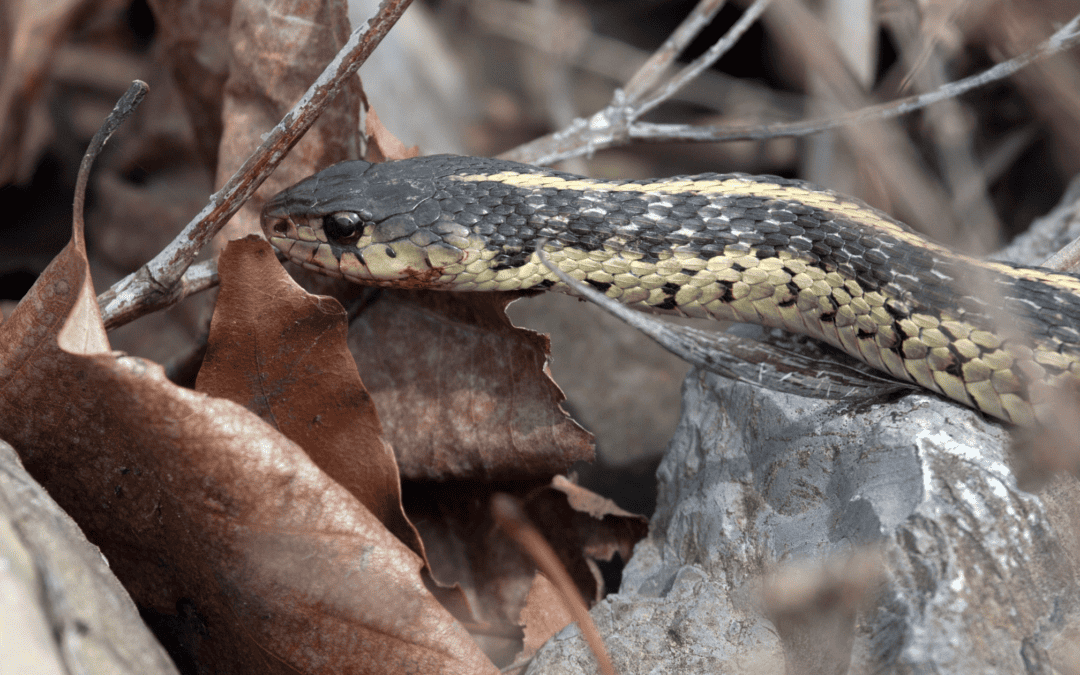
Nov 24, 2023 | Wildlife
Georgia, with its diverse wildlife, is home to a variety of snake species. As temperatures begin to drop, many people wonder if snakes, like other animals, hibernate during the winter months. In this blog post, we’ll explore the intriguing world of snake hibernation, the differences between hibernation and brumation, and provide valuable tips for effective snake control in your Georgia home.
Do Snakes Hibernate?
Contrary to popular belief, snakes don’t undergo true hibernation. Instead, they enter a state called brumation. While hibernation involves a deep sleep, brumation is more of a slowed-down metabolic state. Snakes become less active, but they are not completely dormant. This adaptation allows them to conserve energy during colder months, making it easier to survive until warmer temperatures return.
Understanding Brumation
Brumation typically occurs when temperatures drop, signaling snakes to find a sheltered spot to wait out the cold season. Unlike mammals in hibernation, snakes may occasionally emerge during milder days to bask in the sun and regulate their body temperature. Understanding this behavior is crucial for effective snake control, especially if you want to keep these slithering creatures away from your property.
Tips for Snake Control in Georgia
- Seal Entry Points: Snakes are excellent at finding small openings to enter homes. Inspect and seal any gaps or cracks in the foundation, walls, and windows to prevent them from slithering in.
- Trim Vegetation: Keep your yard well-maintained by trimming tall grass, bushes, and overgrown vegetation. Snakes seek shelter in these areas, so reducing hiding spots decreases the likelihood of them setting up residence in your yard.
- Remove Attractants: Snakes are attracted to areas with abundant prey. Minimize potential food sources such as rodents by keeping trash sealed, cleaning up fallen fruits, and securing pet food.
- Regular Inspections: Conduct regular inspections of your property, especially in warm seasons when snakes are more active. Early detection can prevent a snake population from establishing itself.
Concerned about snakes on your property? Our expert pest control team in Georgia is here to help! Whether you need snake removal or wildlife management, we offer effective and humane solutions. Request a free pest control quote today to safeguard your home and enjoy a snake-free environment.
Understanding the habits of snakes during colder months is essential for effective snake control in Georgia. By implementing these tips and being proactive, you can reduce the likelihood of encountering snakes on your property. For comprehensive snake removal and pest control services, reach out to an experienced pest control company. Enjoy peace of mind in every season with our reliable wildlife management solutions.
Request your free pest control quote today and keep your home snake-free!
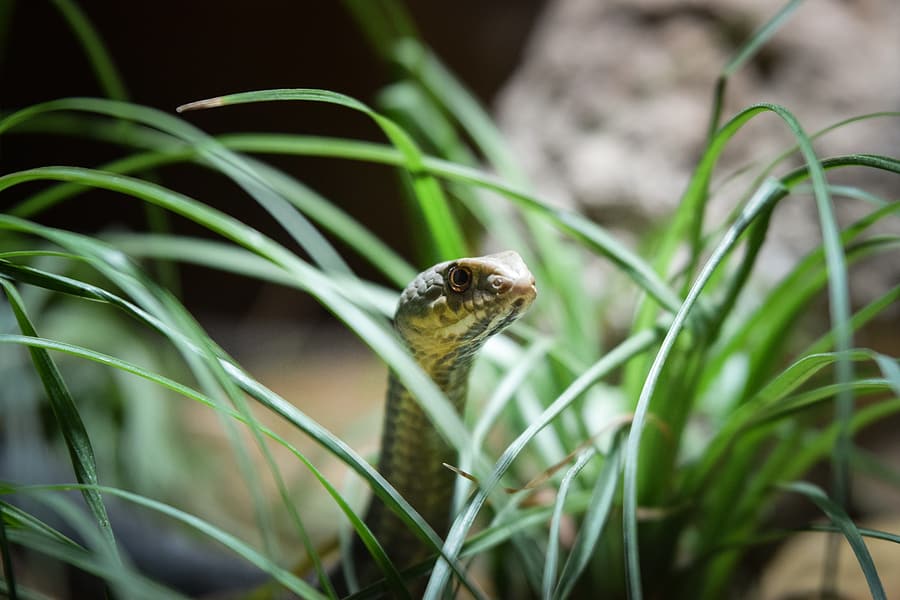
Oct 20, 2023 | Pest Control
Georgia’s diverse wildlife and lush greenery make it a picturesque place to live, but it also attracts various critters, including snakes. While many snakes in Georgia are non-venomous and beneficial, encountering them in your yard can be unnerving. To ensure your family’s safety and peace of mind, we’ll explore natural ways to keep snakes away using common snake repellent plants, discuss common snakes found in Georgia, and provide tips for prevention and snake removal.
Common Snakes in Georgia
Before we dive into snake-repelling plants, let’s get familiar with some of the common snakes you might encounter in Georgia:
- Eastern Garter Snake: Harmless and small, garter snakes are commonly found throughout Georgia.
- Eastern Rat Snake: A beneficial snake that helps control rodent populations.
- Copperhead Snake: One of the few venomous snakes in Georgia, identifiable by its copper-colored head.
- Eastern Diamondback Rattlesnake: The largest venomous snake in North America, though encounters are rare.
Now, let’s explore some natural methods to keep these serpents at bay.
Repelling Snakes with Plants
- Lavender: Lavender’s fragrant scent is lovely to us but offensive to snakes. Plant it along paths and near entry points to your home.
- Marigolds: The strong odor of marigolds deters not only snakes but also a range of other pests.
- Rosemary: This aromatic herb is an excellent choice for snake repellent. Plant it around your garden or entryways.
- Onion and Garlic: Both onion and garlic plants can help keep snakes away due to their pungent scent.
- Lemongrass: Lemongrass contains citronella, which is a natural snake repellent. Plant it in your garden or keep it in pots around your outdoor areas.
Preventing and Eliminating Snakes
Aside from using snake-repellent plants, here are some additional tips to prevent and eliminate snakes from your yard:
- Keep Your Yard Neat: Trim overgrown grass, remove debris, and eliminate hiding spots like woodpiles and tall shrubs.
- Secure Your Home: Seal any cracks or gaps in your home’s foundation, windows, and doors to prevent snakes from entering.
- Control Rodents: Snakes are attracted to prey like rodents. Implement rodent control measures to reduce the rodent population in your area.
- Regular Inspections: Periodically inspect your yard for snake presence, shed skins, or nests.
- Professional Pest Control: If you’re dealing with a persistent snake problem or have concerns about venomous snakes, don’t hesitate to contact a professional pest control company. Request a free pest control quote from experts in the field.
Conclusion
Living in Georgia’s beautiful landscape also means sharing your space with wildlife, including snakes. By using snake-repelling plants, maintaining your yard, and taking steps to prevent snake encounters, you can enjoy the natural beauty of Georgia while keeping slithery intruders at bay. If you need help with pest control, request a free quote from a trusted pest control company to ensure a snake-free environment for your family.




